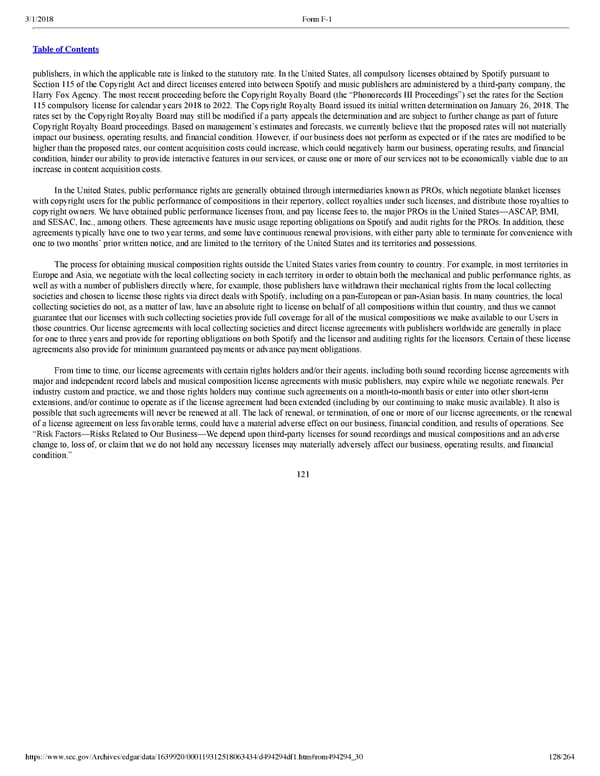128/264 publishers, in which the applicable rate is linked to the statutory rate. In the United States, all compulsory licenses obtained by Spotify pursuant to Section 115 of the Copyright Act and direct licenses entered into between Spotify and music publishers are administered by a thirdparty company, the Harry Fox Agency. The most recent proceeding before the Copyright Royalty Board (the “Phonorecords III Proceedings”) set the rates for the Section 115 compulsory license for calendar years 2018 to 2022. The Copyright Royalty Board issued its initial written determination on January 26, 2018. The rates set by the Copyright Royalty Board may still be modified if a party appeals the determination and are subject to further change as part of future Copyright Royalty Board proceedings. Based on management’s estimates and forecasts, we currently believe that the proposed rates will not materially impact our business, operating results, and financial condition. However, if our business does not perform as expected or if the rates are modified to be higher than the proposed rates, our content acquisition costs could increase, which could negatively harm our business, operating results, and financial condition, hinder our ability to provide interactive features in our services, or cause one or more of our services not to be economically viable due to an increase in content acquisition costs. In the United States, public performance rights are generally obtained through intermediaries known as PROs, which negotiate blanket licenses with copyright users for the public performance of compositions in their repertory, collect royalties under such licenses, and distribute those royalties to copyright owners. We have obtained public performance licenses from, and pay license fees to, the major PROs in the United States—ASCAP, BMI, and SESAC, Inc., among others. These agreements have music usage reporting obligations on Spotify and audit rights for the PROs. In addition, these agreements typically have one to two year terms, and some have continuous renewal provisions, with either party able to terminate for convenience with one to two months’ prior written notice, and are limited to the territory of the United States and its territories and possessions. The process for obtaining musical composition rights outside the United States varies from country to country. For example, in most territories in Europe and Asia, we negotiate with the local collecting society in each territory in order to obtain both the mechanical and public performance rights, as well as with a number of publishers directly where, for example, those publishers have withdrawn their mechanical rights from the local collecting societies and chosen to license those rights via direct deals with Spotify, including on a panEuropean or panAsian basis. In many countries, the local collecting societies do not, as a matter of law, have an absolute right to license on behalf of all compositions within that country, and thus we cannot guarantee that our licenses with such collecting societies provide full coverage for all of the musical compositions we make available to our Users in those countries. Our license agreements with local collecting societies and direct license agreements with publishers worldwide are generally in place for one to three years and provide for reporting obligations on both Spotify and the licensor and auditing rights for the licensors. Certain of these license agreements also provide for minimum guaranteed payments or advance payment obligations. From time to time, our license agreements with certain rights holders and/or their agents, including both sound recording license agreements with major and independent record labels and musical composition license agreements with music publishers, may expire while we negotiate renewals. Per industry custom and practice, we and those rights holders may continue such agreements on a monthtomonth basis or enter into other shortterm extensions, and/or continue to operate as if the license agreement had been extended (including by our continuing to make music available). It also is possible that such agreements will never be renewed at all. The lack of renewal, or termination, of one or more of our license agreements, or the renewal of a license agreement on less favorable terms, could have a material adverse effect on our business, financial condition, and results of operations. See “Risk Factors—Risks Related to Our Business—We depend upon thirdparty licenses for sound recordings and musical compositions and an adverse change to, loss of, or claim that we do not hold any necessary licenses may materially adversely affect our business, operating results, and financial condition.” 121
 Spotify F1 | Interactive Prospectus Page 127 Page 129
Spotify F1 | Interactive Prospectus Page 127 Page 129